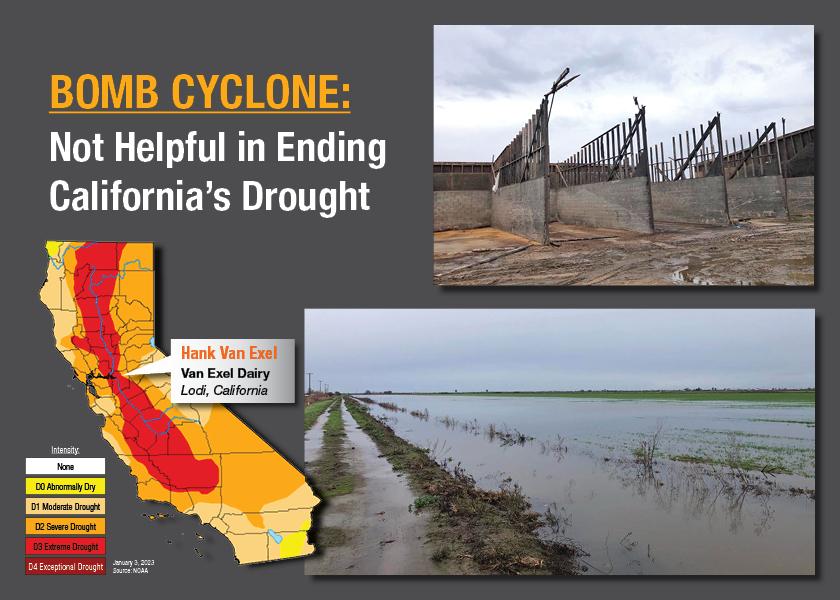Bomb Cyclone: Not Helpful in Ending California's Drought

The bomb cyclone has sucker punched California—flooding homes and roads and knocking out power. While many farmers have prayed for rain to end the ongoing drought plaguing the state, a leading expert says that the bomb cyclone will not end California’s persistent drought.
“The short answer is no, this bomb cyclone will not end the drought in California,” Dr. Thomas Borch with Colorado State University says.
Borch shares that consistent rain patterns throughout the year are needed in order to end the drought facing the Golden State.
“Not these fast and heavy storms,” he says. “Also due to the increase in temperature, we see higher evaporation rates than previously and combine that we are rapidly increasing the demand for water and you end up with water scarcity.”
According to the U.S. Drought Monitor, the downpours facing California are expected to bring short-term relief. A month ago, around 85% of the state was in the midst of a ‘severe drought,’ which has fallen to about 71% since the bomb cyclone made its way to the Golden State.
Richard Heim, a meteorologist with the National Centers for Environment Information says, “We need this stuff to happen this month, February, March, April — every month to really build up the snowpack, fill up those [water] reservoirs and knock down those [precipitation] deficits. “Unfortunately, a lot of it is coming too fast, too heavy.”
Borch agrees with Heim, adding, “Most stormwater runs into small bodies of water like creeks and streams, although it will likely head to whatever water source is close by,” he shares. “Eventually, that water will travel to other larger bodies of water, like river, lakes, or oceans.”
Broch shares that currently a lot of focus is set on trying to treat and reuse stormwater.
California Farmer: The Worst We've Ever Experienced
Located in Lodi, Calif., 40 miles southeast of Sacramento, dairy farmer Hank Van Exel says that the main cause of drought is that California has not built any dams.
“Especially on the Cosumnes River,” he says. “It runs wild. This dam was voted on years ago, but never built.”
Van Exel says he bets 75% of the extra precipitation that comes out of the “Bomb Cyclone” will go to the ocean.
As of Monday afternoon, Van Exel says that terrible winds up to 60 mph have taken hay barns and he just learned that a neighboring dairy’s freestall barn is gone.
“They are saying that area might have to evacuate,” he says. “A lot of the plastic of the silo pits have been blown away and it got 3 inches of rain on it.”
Last week Van Exel received 10 inches of rain and was out of power for 36 hours but shares that so far, he has not had to dump any milk.
“By far this is the worst we have ever experienced,” Van Exel says. “The problem is that this storm is relentless. We get a 6-hour break and then you lose everything you gain the next night.”







